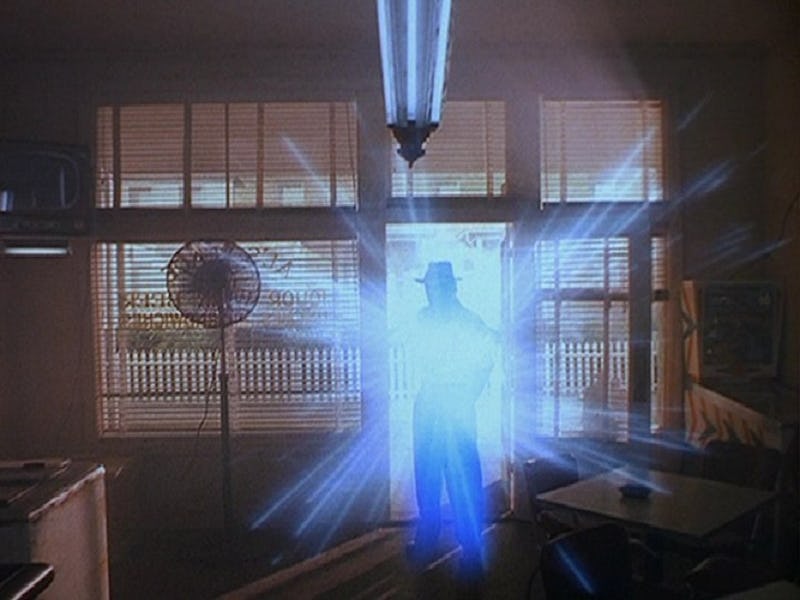How One Legendary Show Redefined Our Relationship With Time Travel
Despite closing on a misspelled title card, “Mirror Image” understood the show’s underlying sense of grief.

It’s not unusual for a television series to endure a disappointing finale. When cancellation can come suddenly and studios try to wring every last drop from a hit series, a satisfying ending is far from guaranteed. Game of Thrones, Dexter, Battlestar Galactica... television is replete with popular shows that failed to stick the landing.
For Quantum Leap, the catalyst behind its divisive final episode, “Mirror Image,” was uncertainty. Airing on May 5, 1993, it was both a finale and a way to keep the door ajar for a potential return. But while it ended the series in a way that left most fans cold, “Mirror Image” arguably captures everything that made Quantum Leap so watchable.
The episode opens with Dr. Sam Beckett (Scott Bakula) leaping into the doorway of a mining town’s bar. He sits at the bar, orders a drink, and checks his reflection in the mirror. For the first time in five seasons, the face staring back is his own. Sam has jumped into his own body.
As the bar fills with familiar faces from past adventures and Al (Dean Stockwell) and Gooshie (Dennis Wolfberg) frantically search for Sam from the future, Sam grows increasingly suspicious. The bartender is also named Al, and he appears to know more about Sam than he’s letting on.
As the episode progresses, Sam becomes embroiled in the miners’ struggles against the surreal backdrop of his deja vu. He watches another miner leap in front of him and, in the face of the seemingly omniscient bartender, begins to think the man slinging drinks is God. Sam starts to think the bartender has been controlling his leaps all along, but the bartender quickly dispels the notion.
When Sam does get some answers, they’re not what he expects. No one’s controlling his leaps but him, a set-up for a new season that never came. Instead of Al searching for a newly enlightened Sam, the series ends with a title card that reads, “Dr. Sam Becket never returned home.” It didn’t even spell Sam’s name right.
It’s an inhumane way to end the show, especially for an episode that highlights how intrinsically human Quantum Leap’s story is. For a long time, time travel was about journeys to exotic pasts and futures, wacky adventures à la the space whales in Star Trek IV: The Voyage Home, and wild speculation. Quantum Leap had its share of hijinks, sure, but it turned time travel into a way to examine our own, often shameful, history. The show touched on racism, the LGBTQ+ experience, and disability in ways uncommon to mainstream genre television. It was about learning from the past and writing our wrongs, all tied up in a relatable story about trying to get home.
Time comes for us all, even Scott Bakula.
All of that is exemplified in the final scenes of “Mirror Image,” as Sam tells the bartender he wants to go home while accepting he can’t. Even if he can send himself home, he knows he has a responsibility to keep leaping and righting historical wrongs, starting with his own, when he wouldn’t help Al (the real Al) return to his wife, Beth, back in “M.I.A.” It encapsulates what Quantum Leap was about at its best, and what many time travel fantasies are really about: grief.
Sam is grieving from the moment he sees his reflection and notices he’s aged. Time is relative and, though he may not experience it like the rest of us, he’s not immune to its passing. 30 years later, it’s a grief that remains relatable, which is why when Sam jumps to Beth and finally lets her know that Al is coming home, it feels so cathartic.
That catharsis was undermined by the two title cards that end the series for good, a decision that left fans frustrated. Even now, with an alternate ending unearthed in 2019 and the series rebooted by NBC in 2022, fans have wondered whether the wrongs of “Mirror Image” can be righted. As the new series progresses, can Sam Beckett leap back onto our screens to get a better ending?
Decades on, it’s easier to see how “Mirror Image” encapsulates the humanity that made Quantum Leap both revolutionary and so watchable. But that doesn’t mean the hurt is gone, and “Mirror Image” has become a reminder, like so much of Quantum Leap’s history-altering narrative, of what could have been.
Subscribe for free to Inverse’s award-winning daily newsletter.